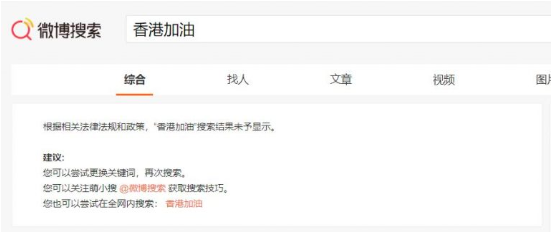Sensitive Words highlights keywords that are blocked from Sina Weibo search results. CDT independently tests the keywords before posting them, but some searches later become accessible again. We welcome readers to contribute to this project so that we can include the most up-to-date information. You can also browse our archive of sensitive words.
On June 10th, a Weibo user broke the news that searches for the term “Let’s go Hong Kong” (香港加油) are now censored on the popular microblogging site, with queries yielding the statement “search results are not displayed according to relevant laws, regulations, and policies.” CDT Chinese editors conducted a search test on June 11 Beijing time confirming that the term has indeed been blocked on Sina Weibo. The following is a screenshot of the censorship notice:
The Weibo censorship comes days after Sunday’s mass protest in Hong Kong, where an estimated one million people rallied against proposed legal amendments that would allow the extradition of suspects to mainland China for the first time. Many in Hong Kong fear that the planned extradition law will be used by authorities to target political dissidents and further erode the region’s shrinking liberties. More protesters are expected to take to the streets in planned mass demonstrations and strikes on Wednesday, when the extradition bill is scheduled to be introduced to Hong Kong’s Legislative Council. The Guardian’s Verna Yu reports that hundreds of people have already gathered outside government headquarters as of Tuesday night:
Hong Kong faces a citywide shutdown on Wednesday after hundreds of businesses, parents and teachers called for a boycott of work and classes to show their opposition to the proposed bill, which would allow mainland China to pursue fugitives in the former British colony.
The law is due for a second round of debate in the 70-seat legislative council. Critics said the legislation would give Beijing the ability to pursue government critics and other political opponents in Hong Kong.
An online petition had called for 50,000 people to surround the legislature at 10pm (2pm GMT) on Tuesday night to stay until Wednesday morning. Protesters planned to stage an overnight demonstration just outside the legislative council in Admiralty district but authorities closed the designated protest area and cordoned off a nearby lawn at Tamar Park, outside the legislative council. Police in riot gear were deployed to the protests.
Protesters, blocked from the demonstration zone, filled the streets outside the legislature and the government headquarters. Police searched cars and bicycles and surrounded protesters but the situation remained calm. Sounds of the hymn Sing Alleluia to the Lord wafted through the air, sung by a group in the crowd. [Source]
The bill is expected to go up for a vote on June 2o and to become law despite the protests, Guy Davies and Karson Yiu at ABC News report:
Hong Kong’s leader, Carrie Lam, has said she plans to sign the legislation despite the protests, according to The Associated Press.
The Hong Kong government has been “very savvy” to use the case of Taiwan as the basis for the extradition law, according to King, and the “results from within the legislature will be exactly as the government want.”
“While the protests are the largest and most significant in decades, the impact on the resulting legislation will be limited,” King said. “This being said, they are being very effective in ensuring that Hong Kong’s experience under the ‘One Country, Two Systems’ model is not forgotten. With real implications for Taiwan, the international community would (and should) be very interested to see where this leads.”
However, introduction of the extradition laws is “ill-advised and unnecessary,” according to Tsang, who said it reflects the top down approach of policy making by Chinese Premier Xi Jinping. But neither officials in Hong Kong nor China are likely to change their mind, meaning the crisis could escalate further. [Source]
Note on translation: “加油” (jiayou) is a commonly used Chinese cheer that literally means to “add fuel.” There isn’t a set translation for the term since its English equivalent varies depending on the context in which the term is used.








